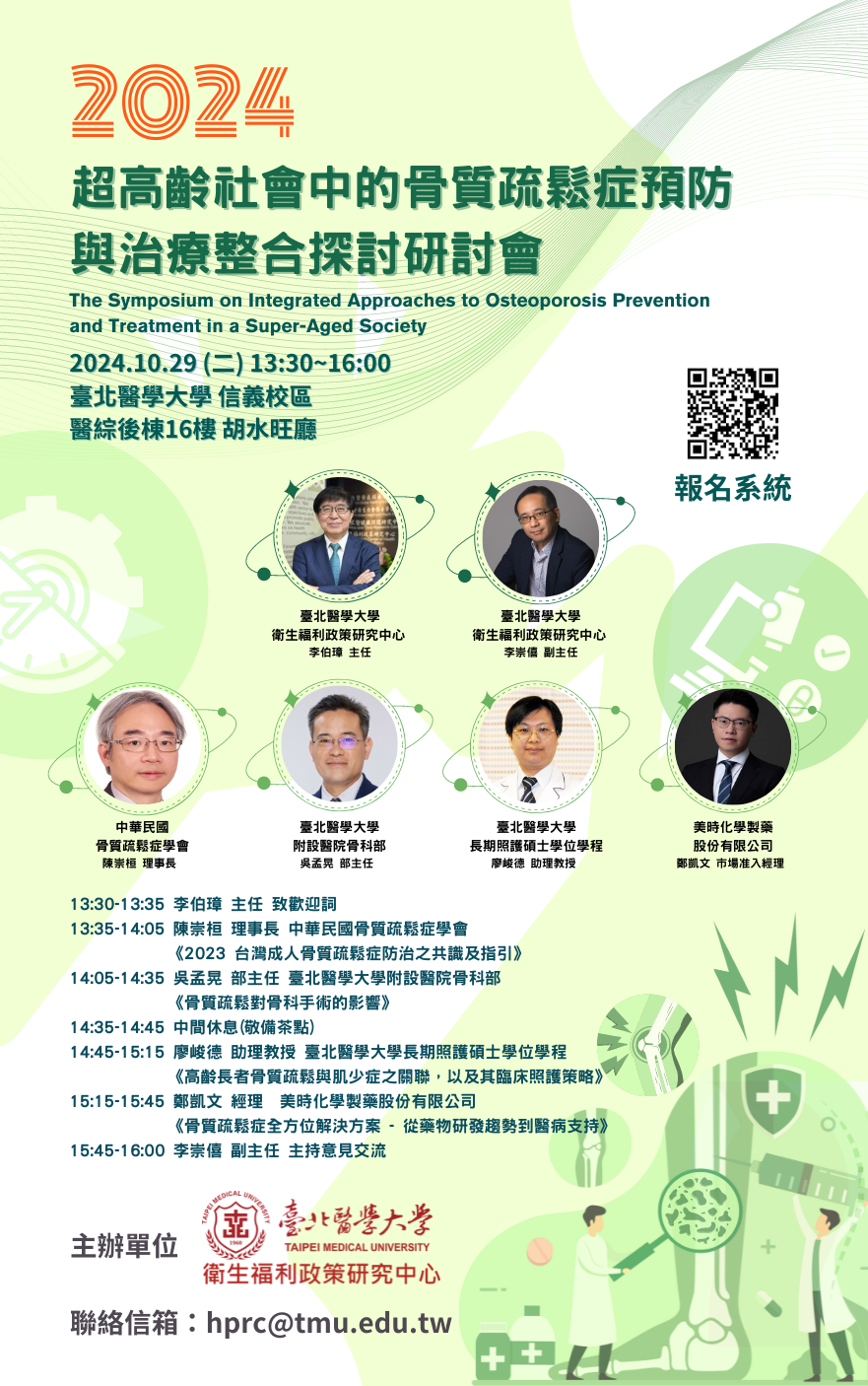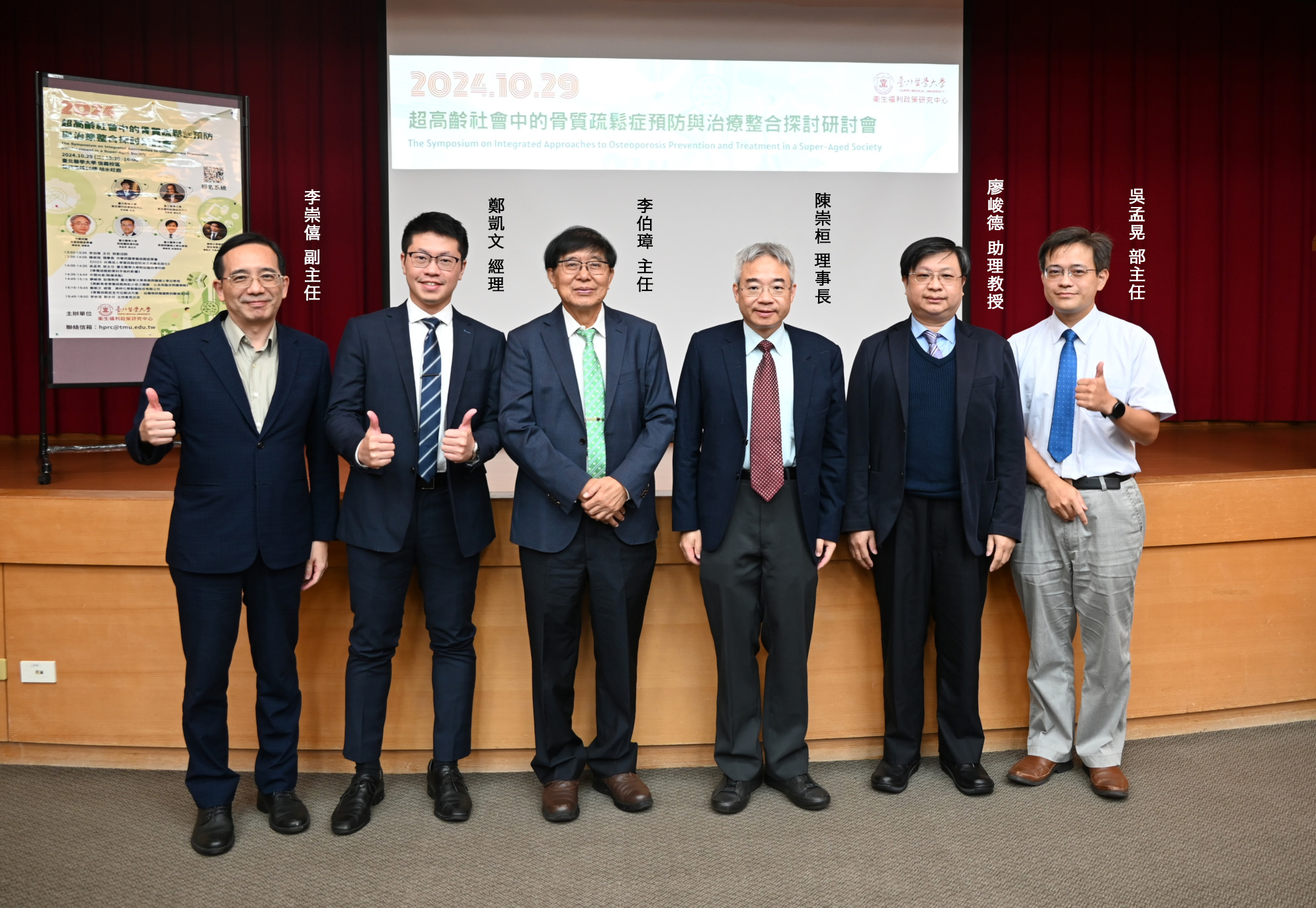Event Introduction
活動簡介

Date
【2024/10/29】

Post-Event Summary
會後摘要
Taipei Medical University Health and Welfare Policy Research Center held the Academic Symposium on Integrated Approaches to Osteoporosis Prevention and Treatment in a Super-Aged Society on October 29, 2024 (Tuesday). This symposium aimed to explore effective strategies for preventing, diagnosing, and treating osteoporosis from multiple perspectives, including policy, healthcare, medication, and care approaches, with the goal of raising public awareness about osteoporosis prevention and creating a solid foundation for improving public health.
Lee Po-Chang, Director of the Health and Welfare Policy Research Center, Taipei Medical University
Director Lee emphasized that, as Taiwan transitions into a super-aged society, osteoporosis cases are rapidly increasing, with the nation’s hip fracture rate ranking the highest in Asia. The health impacts and substantial medical burden caused by fractures are significant. He recommended enhancing bone density testing and early treatment, expanding National Health Insurance (NHI) coverage, and increasing treatment access for high-risk groups to reduce fracture rates and medical costs. Director Lee stressed that the government should closely collaborate with the medical community to promote screening and education, implementing the strategy of “early screening, early treatment” to improve the well-being of the elderly.
Dr. Chen Chong-Huan, President of the Osteoporosis Society of the Republic of China
Dr. Chen introduced the Consensus and Guidelines for the Prevention and Treatment of Osteoporosis in Adults in Taiwan, emphasizing the importance of early diagnosis and targeted treatment. Noting the continuous increase in Taiwan’s hip fracture rate, he recommended regular DXA scans for women over 65 and men over 70. Additionally, Dr. Chen promoted online risk-assessment tools, such as the one-minute questionnaire and OSTAi and MOSTAi self-assessment forms, to help the public understand osteoporosis risks. He also advocated for the Fracture Liaison Service (FLS) model, which utilizes case management to improve treatment adherence and reduce the risk of recurring fractures.
Dr. Wu Meng-Huang, Director of Orthopedics, Taipei Medical University Hospital
Dr. Wu highlighted the risks faced by osteoporosis patients undergoing surgery due to compromised stability in fixation devices, especially during spinal and joint replacement surgeries. He suggested strengthening bone density management before and after surgery to improve success rates and reduce the need for repeat surgeries. He shared strategies from the Osteoporosis Care Center at Taipei Medical University Hospital, which include DXA scans, FRAX risk assessments, and long-term follow-ups, along with exploring remote monitoring and personalized rehabilitation programs to enhance patient quality of life.
Professor Liao Chun-Te, Graduate Institute of Long-Term Care, Taipei Medical University
Professor Liao discussed the close association between osteoporosis and sarcopenia in the elderly, highlighting the need to address osteosarcopenia syndrome. He recommended combining screening and treatment strategies for osteoporosis and sarcopenia in clinical practice and developing personalized nutrition and exercise programs to reduce health risks and improve quality of life for elderly individuals.
Kevin Cheng, Manager of Market Access, TTY Biopharm Company
Mr. Cheng discussed osteoporosis prevention and treatment trends from the perspectives of the pharmaceutical market and healthcare industry, emphasizing the crucial role of innovative drugs in improving patient quality of life. He pointed out challenges in promoting new drugs for osteoporosis in Taiwan, such as expediting the introduction of new drugs and enhancing education for healthcare providers and patients to increase awareness of osteoporosis risks and adherence to treatment options.
Policy Recommendations
- Expand Screening Coverage for Osteoporosis:
Strengthen NHI support for bone density screening among high-risk groups, including women over 65 and men over 70, while promoting DXA scans, OSTAi, MOSTAi, and other self-assessment tools to encourage early diagnosis and intervention. - Increase NHI Support for Treatment:
Advocate for NHI to continually review and optimize osteoporosis treatment policies, enabling more high-risk patients to access both pharmacologic and non-pharmacologic treatments, thereby reducing fracture rates and alleviating medical burdens. - Promote the Fracture Liaison Service (FLS) Model:
Encourage the adoption of the FLS model to reinforce case management, provide personalized treatment and follow-up, enhance treatment adherence, and lower the risk of recurrent fractures. - Integrate Care Strategies for Osteoporosis and Sarcopenia:
In elderly healthcare, integrate screening and management of osteoporosis and sarcopenia, with a focus on osteosarcopenia syndrome, by developing personalized nutrition, exercise, and rehabilitation plans. - Facilitate Cross-Sector Collaboration and Public Education:
The government should work with the medical, academic, and pharmaceutical industries to strengthen public education on osteoporosis prevention, increasing awareness and encouraging high-risk groups to actively engage in screening and treatment to achieve healthy aging. - Accelerate Access to Innovative Medications:
Streamline approval processes to facilitate market entry of new osteoporosis medications, and collaborate with healthcare institutions to conduct clinical trials and data collection, promoting the accessibility of novel treatment options.
TMU Research Center for Health and Welfare Policy
Taipei Medical University has become the government’s think tank in the fields of health policy and healthcare, establishing a platform for health and welfare decision-making. It actively participates in health policy discussions to jointly create the well-being of the entire population.
Address:10F.,Biomedical Building, No. 301, Yuantong Rd., Zhonghe Dist., New Taipei City 235603 , Taiwan (R.O.C.)
Tel:02-6620-2589 #16052 #16054
Email:hprc@tmu.edu.tw
News
 【Event Report】The Center hosted the symposium “Protecting Heartbeats, Preventing Sudden Death: A Comprehensive Dialogue from Clinical Practice to Policy,” focusing on clinical approaches and public policy for sudden death prevention.2025-12-01 - 14:21
【Event Report】The Center hosted the symposium “Protecting Heartbeats, Preventing Sudden Death: A Comprehensive Dialogue from Clinical Practice to Policy,” focusing on clinical approaches and public policy for sudden death prevention.2025-12-01 - 14:21 【Honor & Recognition】Congratulations to Director Po-Chang Lee for being recognized by the Taiwan Organ Registry and Sharing Center and the Patient Autonomy Promotion Center, and for receiving the Special Contribution Award for Organ Donation.2025-12-01 - 14:00
【Honor & Recognition】Congratulations to Director Po-Chang Lee for being recognized by the Taiwan Organ Registry and Sharing Center and the Patient Autonomy Promotion Center, and for receiving the Special Contribution Award for Organ Donation.2025-12-01 - 14:00


